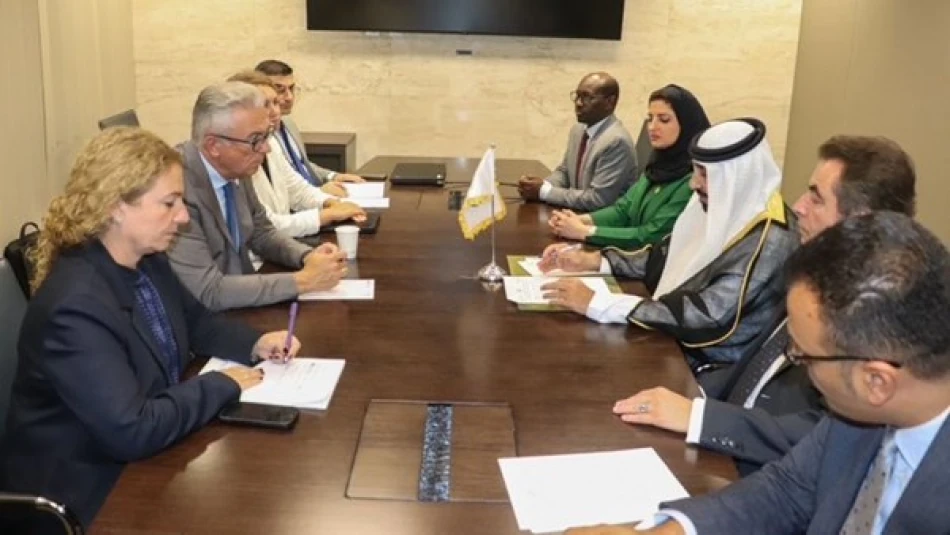
Arab Parliament Speaker Demands Collective European Parliamentary Action to End Occupation Crimes in Gaza
Arab Parliament and European Assembly Forge Historic Partnership Amid Gaza Crisis
In a groundbreaking diplomatic move, the Arab Parliament and the Parliamentary Assembly of the Council of Europe have established their first formal dialogue, using the platform to coordinate international pressure over human rights violations in Gaza. The meeting signals a strategic shift toward cross-regional parliamentary diplomacy as traditional diplomatic channels struggle to address the escalating humanitarian crisis.
Historic First Meeting Sets New Diplomatic Precedent
Mohammed bin Ahmed Al-Yamahi, President of the Arab Parliament, met with Theodoros Rousopoulos, President of the Parliamentary Assembly of the Council of Europe (PACE), on the sidelines of the Sixth World Conference of Speakers of Parliament in Geneva. This inaugural meeting between the two organizations represents a significant evolution in inter-parliamentary cooperation, moving beyond traditional bilateral relationships toward broader regional bloc engagement.
The timing is particularly strategic. As governments face domestic political constraints in addressing the Gaza conflict, parliamentary bodies are emerging as alternative channels for international coordination. This mirrors similar trends seen during the Yugoslav conflicts of the 1990s, when parliamentary assemblies often moved faster than executive branches in condemning human rights violations.
Gaza Crisis Drives Parliamentary Diplomacy
Al-Yamahi emphasized the critical importance of engaging with PACE, given its role in overseeing the European Court of Human Rights and its mandate to promote human rights, democracy, and rule of law. The Arab Parliament leader specifically praised PACE's recent positions rejecting Israeli violations in Gaza and called for a more influential role in shaping a collective European parliamentary stance.
Rousopoulos confirmed that PACE, representing 318 parliamentarians from 46 European countries—extending well beyond the 27 EU member states—has been actively monitoring Gaza through regular resolutions and reports. The assembly's current priority focuses on achieving an unconditional and permanent ceasefire coupled with unrestricted humanitarian aid access.
Institutional Framework for Cooperation
The leaders agreed on concrete mechanisms to formalize their relationship, including granting the Arab Parliament observer status within PACE and signing a memorandum of understanding. Most significantly, they are exploring the possibility of joint parliamentary sessions specifically aimed at mobilizing support for Palestinian causes.
Strategic Implications for Regional Diplomacy
This partnership reflects a broader trend of parliamentary bodies filling diplomatic voids when executive branches face political gridlock. Similar to how the Inter-Parliamentary Union has facilitated dialogue during previous international crises, this Arab-European parliamentary axis could provide more flexible platforms for addressing contentious issues.
For European policymakers, the partnership offers a structured channel to engage with Arab perspectives while maintaining some distance from more controversial governmental positions. The 75-year-old PACE, established in Strasbourg in August 1949, brings institutional credibility and legal expertise through its connection to the European Court of Human Rights.
From an Arab perspective, formal engagement with Europe's premier human rights parliamentary body provides legitimacy and potential leverage in international forums. This approach mirrors successful strategies employed by other regional organizations, such as ASEAN's parliamentary engagement with European institutions during the Myanmar crisis.
Beyond Symbolic Gestures
The practical implications extend beyond diplomatic symbolism. Observer status would grant the Arab Parliament access to PACE's committee structures, enabling sustained engagement on human rights issues across the broader Middle East. Joint parliamentary sessions could generate coordinated pressure on national governments, potentially influencing policy positions that have remained static through traditional diplomatic channels.
This development also signals recognition that the current crisis requires sustained institutional engagement rather than episodic diplomatic interventions. By establishing formal cooperation mechanisms, both organizations are positioning themselves for long-term involvement in regional stability efforts, regardless of immediate political developments.
Most Viewed News

 Layla Al Mansoori
Layla Al Mansoori






